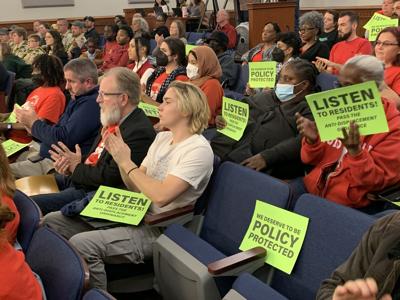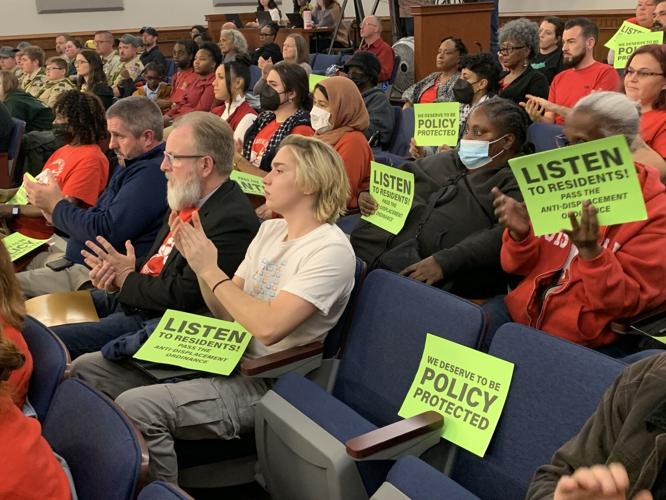LOUISVILLE, Ky. (WDRB) – An ordinance approved by Louisville Metro Council will require new scrutiny for residential developments seeking public aid, triggering a review to see if they put existing residents at risk of being displaced.
Originally meant to address historically Black neighborhoods when it was filed last spring, the legislation was amended to take in all of Metro Louisville.
The ordinance passed the council’s Planning and Zoning Committee Oct. 31 with five members voting in favor and three voting “present.” That moved the item to be discussed at Thursday night's Metro Council meeting.
Dozens of supporters packed one side of the council chamber, wearing red and holding signs. Jessica Bellamy, a Louisville Tenants Union organizer, told the council about her own struggles to find a home in Smoketown, where her family is originally from.
"The choice is simple," Bellamy said. "Are you for displacement, or against it?"
Under the ordinance, any residential project asking for public land, tax increment financing, tax abatements or other incentives would undergo an assessment to determine if the proposal could possibly force people from their homes.
A “results matrix” created by researchers selected by Metro Government’s Office of Housing and Community Development would determine when a project wouldn't qualify for those public resources. It, and a form used by developers, would have to be ratified by the Metro Council.
Councilmember Jecorey Arthur (I-4th District) called the 11-page ordinance the “latest, cleanest version” and noted that the anti-displacement goals mirror recommendations made in the city’s recently updated land-use plan and housing analysis.
“They come from very real struggles that people are facing in this city every single day,” Arthur, the chief sponsor, said at the late October meeting. “And I want to just commend this committee and the Metro Council at large when we pass this to say that we're doing something brand new that's largely never been done in the South and maybe even in the country.”
The assessment’s findings would be attached to any legislation that the council must consider, such as a tax increment financing ordinance.
When the ordinance was called for a vote Thursday night, it passed unanimously.
Republicans credited Arthur with approaching them early, considering feedback, and making changes that led to the 25-0 vote.
"When you have government money significantly contributing to any project, it's a reasonable thing to ask is how is that impacting the people around that development," Councilman Anthony Piagentini (R-19th District) said. "And knowing that before everything was completed."
Councilmember Ben Reno-Weber (D-8th District), who, along with Kumar Rashad (D-3rd District), co-sponsored the ordinance, said that it's important that the assessment is driven by data.
"We're not operating from this sort of mythology of every development that has residential implications is going to displace people. We can know if this is really true," Reno-Weber said.
Bellamy said the passage of the ordinance is a big step forward for her potential future in Smoketown.
"It means a slowdown of the hemorrhage of people from my community and all others across this city," Bellamy said. "So many people have put in a piece, and so this win is shared across Louisville and across everybody who was a part of this."
Arthur said the ordinance passed with unanimous support because of those who showed up to every discussion in committee.
"The power of the people is stronger than the people in power," Arthur said.
The measure also creates the 12-person Louisville Metro Anti-Displacement Commission to review the assessment program and suggest changes, if needed.
Louisville’s mayor would name the nine voting members of the board from areas of the city considered at heightened risk of displacement because of higher renter rates, as determined by Metro Government’s housing office and the Affordable Housing Trust Fund’s housing needs assessment.
The other three members — mayor-appointed representatives from Metro Government — wouldn’t have voting power.
The commission would have other responsibilities, including reviewing discrimination findings from the city’s Human Relations Commission and helping to refer those discriminated-against households or businesses to programs such as down payment aid and home repair funds. They would be given priority for those programs.
The Berrytown Neighborhood Association, Louisville Tenants Union and the Historically Black Neighborhood Assembly are among the groups that backed the ordinance. The Berrytown association called on the council in a letter this week to take “decisive action.”
“It is protective, practical, clarifying, and flexible,” the letter read. “Its flexibility is part of its brilliance, because it is designed to tailor anti-displacement support based on the needs of the community.”
Copyright 2023 WDRB Media. All Rights Reserved.














